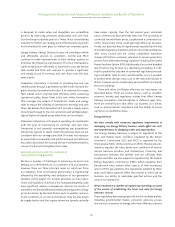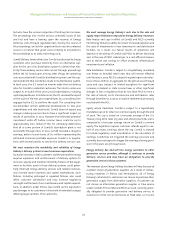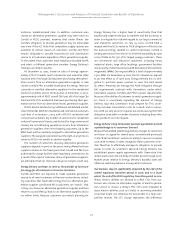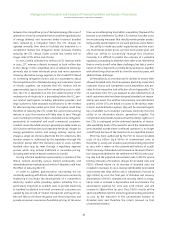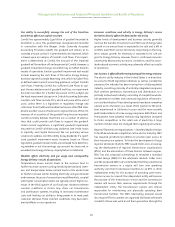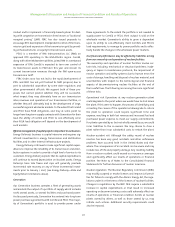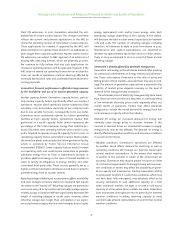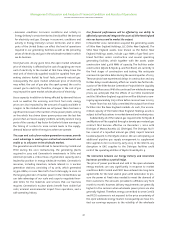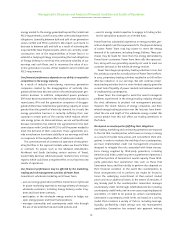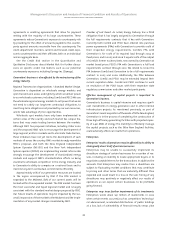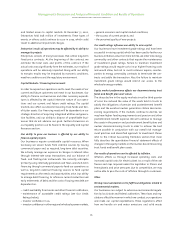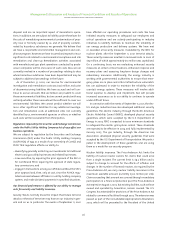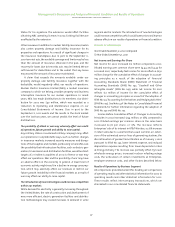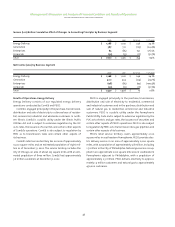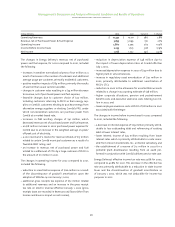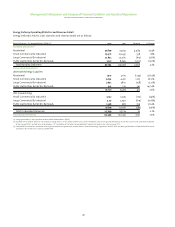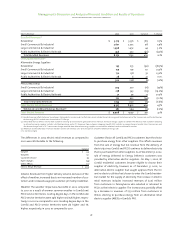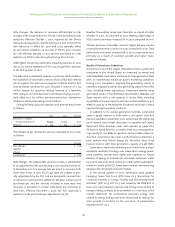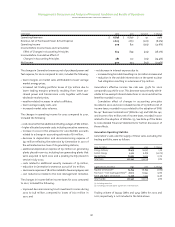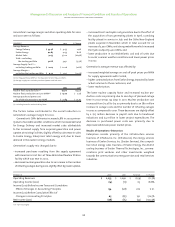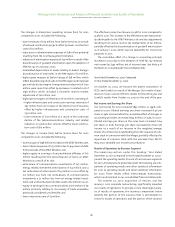ComEd 2002 Annual Report Download - page 37
Download and view the complete annual report
Please find page 37 of the 2002 ComEd annual report below. You can navigate through the pages in the report by either clicking on the pages listed below, or by using the keyword search tool below to find specific information within the annual report.
Management’s Discussion and Analysis of Financial Condition and Results of Operations
exelon corporation and subsidiary companies
35
and limited access to capital markets. At December 31, 2002,
Enterprises held $128 million of investments. These types of
events, or others, could continue to occur in 2003, which could
result in additional impairment charges.
Enterprises’ results of operations may be affected by its ability to
manage its projects.
Enterprises consists of many businesses that utilize long-term
fixed-price contracts. At the beginning of the contract, we
estimate the total costs and profits of the contract; if the
actual costs vary significantly form the estimates,our results of
operations will be adversely impacted. Along with our ability
to execute, results may be impacted by economic conditions,
weather conditions and the regulatory environment.
Capital Markets / Financing Environment
In order to expand our operations and to meet the needs of our
current and future customers, we invest in our businesses. Our
ability to finance our businesses and other necessary expendi-
tures is affected by the capital intensive nature of our opera-
tions and our current and future credit ratings. The capital
markets also affect our decommissioning trust funds and ben-
efit plan assets. Our financing needs will be dependent on our
strategic direction of acquiring integrated utilities and genera-
tion facilities, and our ability to dispose of unprofitable busi-
nesses that do not advance our goals. Further discussions on
our liquidity position can be found in the Liquidity and Capital
Resources section.
Our ability to grow our business is affected by our ability to
finance capital projects.
Our businesses require considerable capital resources. When
necessary, we secure funds from external sources by issuing
commercial paper and, as required, long-term debt securities.
We actively manage our exposure to changes in interest rates
through interest-rate swap transactions and our balance of
fixed- and floating-rate instruments. We currently anticipate
primarily using internally generated cash flows and short-term
financing through commercial paper to fund our operations as
well as long-term external financing sources to fund capital
requirements as the needs and opportunities arise. Our ability
to arrange debt financing, to refinance current maturities and
early retirements of debt,and the costs of issuing new debt are
dependent on:
– credit availability from banks and other financial institutions,
– maintenance of acceptable credit ratings (see Our Credit
Ratings below),
– investor confidence in us,
– investor confidence in other regional wholesale power markets,
– general economic and capital market conditions,
– the success of current projects, and
– the perceived quality of new projects.
Our credit ratings influence our ability to raise capital.
Our businesses have investment grade ratings and have been
successful in raising capital,which has been used to further our
business initiatives.Also,from time to time,we enter into energy
commodity and other contracts that require the maintenance
of investment grade ratings. Failure to maintain investment
grade ratings would require us to incur higher financing costs
and would allow, but not in most instances require, counter-
parties to energy commodity contracts to terminate the con-
tracts and settle the transaction. Also, the failure to maintain
investment grade ratings would restrict our access to the
wholesale energy markets.
Equity market performance affects our decommissioning trust
funds and benefit plan asset values.
The sharp decline in the equity markets since the third quarter
of 2000 has reduced the value of the assets held in trusts to
satisfy the obligations of pension and postretirement benefit
plans and the eventual nuclear generation station decommis-
sioning requirements. If the markets continue to decline, we
may have higher funding requirements and pension and other
postretirement benefit expense. We will continue to manage
the assets in the pension and postretirement benefit plans and
nuclear decommissioning trusts in order to achieve the best
return possible in conjunction with our overall risk manage-
ment practices and diversified approach to investment. Please
refer to the Critical Accounting Estimates section that more
fully describes the quantitative financial statement effects of
changes in the equity markets on the nuclear decommissioning
trust funds and benefit plan assets.
Our results of operations can be affected by inflation.
Inflation affects us through increased operating costs and
increased capital costs for electric plant. As a result of the rate
freezes and caps imposed under the legislation in Illinois and
Pennsylvania and price pressures due to competition, we may
not be able to pass the costs of inflation through to customers.
Other
We may incur substantial cost to fulfill our obligations related to
environmental matters.
Our businesses are subject to extensive environmental regula-
tion by local, state and Federal authorities. These laws and reg-
ulations affect the manner in which we conduct our operations
and make our capital expenditures. These regulations affect
how we handle air and water emissions and solid waste


